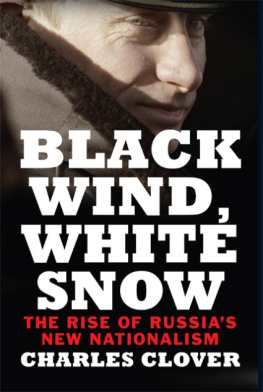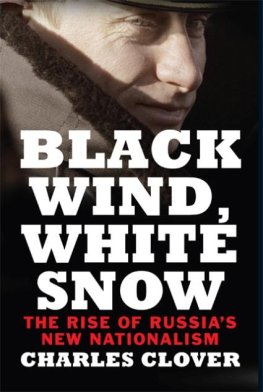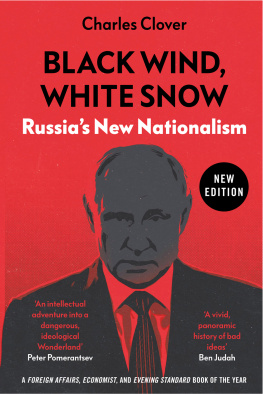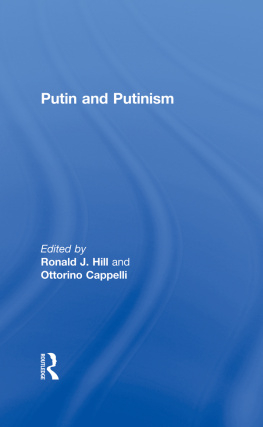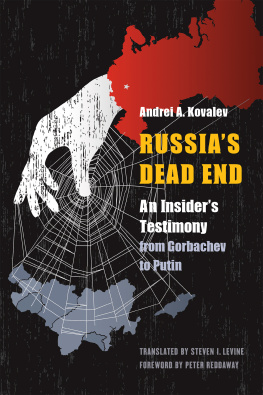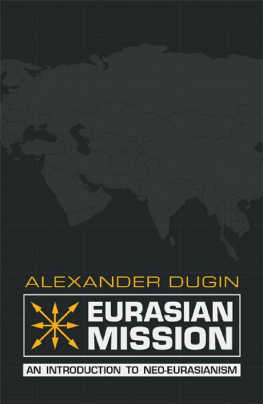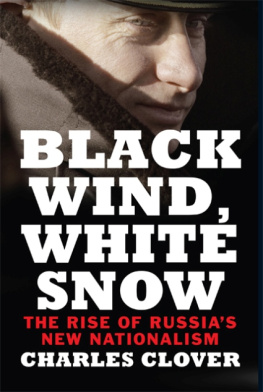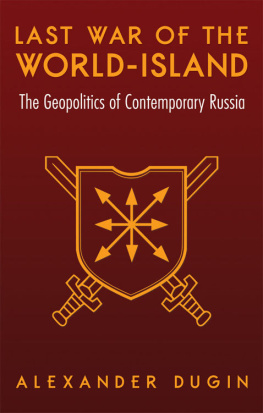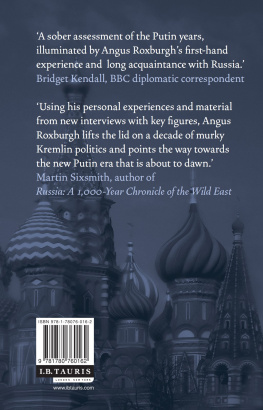

Copyright 2016 Charles Clover
All rights reserved. This book may not be reproduced in whole or in part, in any form (beyond that copying permitted by Sections 107 and 108 of the U.S. Copyright Law and except by reviewers for the public press) without written permission from the publishers.
For information about this and other Yale University Press publications, please contact:
U.S. Office:
Europe Office:
Typeset in Minion Pro by IDSUK (DataConnection) Ltd
Printed in Great Britain by Gomer Press, Llandysul, Ceredigion, Wales
Library of Congress Cataloging-in-Publication Data
Clover, Charles, 1968
Title: Black wind, white snow : the rise of Russias new nationalism / Charles Clover.
Description: New Haven : Yale University Press, 2016. | Includes bibliographical references and index.
LCCN 2015037501 | ISBN 9780300120707 (hardback)
LCSH: Putin, Vladimir Vladimirovich, 1952Political and social views. | Putin, Vladimir Vladimirovich, 1952Friends and associates. | Eurasian school. | NationalismRussia (Federation) | Political cultureRussia (Federation) | Russia (Federation)Politics and government1991- | Russia (Federation)Foreign relationsPhilosophy. | BISAC: HISTORY / Europe / Russia & the Former Soviet Union. | HISTORY / Europe / Former Soviet Republics. | HISTORY / Modern / 21st Century.
Classification: LCC DK510.766.P87 C56 2016 | DDC 947.086/2092dc23
LC record available at http://lccn.loc.gov/2015037501
A catalogue record for this book is available from the British Library.
10 9 8 7 6 5 4 3 2 1
To Rachel and Jaya
Now I held in my hands a vast methodical fragment of an unknown planets entire history, with its architecture and its playing cards, with the dread of its mythologies and the murmur of its languages, with its emperors and its seas, with its minerals and its birds and its fish, with its algebra and its fire.
Jorge Luis Borges
CONTENTS

Map of Eurasia, first outlined by Sir Halford Mackinder in his The Geographical Pivot of History, and reproduced in Russian by Alexander Dugin in The Foundations of Geopolitics (1997).
PREFACE
T his book grew out of a meeting I had in 1998, soon after I arrived in Ukraine as a rookie stringer for the Financial Times. After a few months of reporting from Kiev, the Foreign Ministry finally acceded to a request for an interview, putting forward their courtly, if rather severe, first deputy foreign minister, Anton Buteiko, to gently lobby me on some of my more persistent errors (its Lviv, not Lvov anymore) and to give me a bit of a steer politically.
Much of what he said was standard boilerplate about Ukraines partnership with Russia and its desire for integration with Euro-Atlantic structures two objectives that at the time did not seem incompatible. But towards the end of the meeting, he mentioned an interesting tidbit.
A book had been published in Russia a few months previously, called The Foundations of Geopolitics. Its author, Alexander Dugin, was known to have the backing of conservative Russian hardliners, said Buteiko, and the book was produced with the help of Russias Academy of the General Staff. It laid out plans for the dismemberment of Ukraine. It might be worth a read, he said, if I wanted to get an idea of what his former colleagues in Moscow were thinking.
The next day I went to the Lesya Ukrainka public library in Kiev and found a copy. (The book was not available in bookstores, for understandable reasons.) I was intrigued: on the cover was some sort of ancient Norse rune, plus a map of the former Soviet Union. And inside, sure enough, was a note thanking General Nikolay Klokotov, head of the department of strategy at the Academy of the General Staff, for his insightful analytical help with the project.
The book was an exposition of right-wing theories of nationalism; fascistic theories from interwar Nazis, like geopolitics; plus a political movement I had never heard of, known as Eurasianism. This appeared to describe a plan to put the Soviet Union back together again, en route to creating a world-dominating empire.
There was plenty to worry a Ukrainian foreign minister, including one passage that, in light of the events in Georgia and Ukraine over the past half-decade, deserves some attention:
One absolute imperative of Russian geopolitics is the total and unfettered control of Moscow over the entire length of the Black Sea coast stretching from Ukrainian to Abkhazian territory The north shore of the Black Sea should be exclusively Eurasian and centrally obey Moscow.
On my next visit to Moscow, I met Alexander Dugin, the books author, at his office in a public library across from the golden onion domes and secluded ponds of the Novodevichy Convent in Moscow. A former dissident, who cranked out his manifestos in dingy basements and on Xerox machines, Dugins search for freedom from totalitarian rule led him in a very different direction from many of his fellow Soviet-era intellectuals.
Russias salvation, Dugin believed, lay in turning back the tide of democratic liberalism, re-establishing repressive central control, and bringing to power a regime of patriots, beholden to an imperial concept of Russia, a multinational, multi-ethnic, multi-confessional, but distinctly Russian and distinctly non-Western geopolitical space Eurasia.
Dugins very existence is interesting, given the booming triumphalism which accompanied the end of the Cold War. He had spent his life wrestling with the chains of authoritarianism, only to embark on building a new type of authoritarianism when the old type finally fell. He reminded me of Shigalov, the character from Fedor Dostoevskys novel Demons who said: Starting from unlimited freedom, I arrive at unlimited despotism.
Dugin may have looked the part of a philosophy-crazed Dostoevsky-esque anchorite. But in fact he was a funny, hip and altogether likeable guy as well as being one of the most interesting, well-read intellectuals I have ever met. To this day I wonder: does he actually believe it or not? But I know that that is somehow irrelevant. Whether he is a true believer or is just playing a role, he carries both off equally well, flitting in and out of references to the occult, numerology, fascism, postmodernism and French cultural theory. But I was intrigued by the reference to the General Staff: in addition to being a conspiracy theorist, was Dugin actually part of a conspiracy? Or was he just a talented self-publicist? Dugins answer confirmed both possibilities: There are high-level people within the state who support these views.
When a piece of mine criticizing Dugin and his views ran in the arch-Atlanticist journal Foreign Affairs in 1999, Dugin did not take umbrage, and we soon became unlikely penpals.
Though I left Russia for the Middle East and South Asia soon after the 9/11 attacks, I continued to take an interest in Dugin and his Eurasianist movement. And when I returned to London, I resolved to write a book about what I had learned. That meant going back through a centurys worth of writing, as well as conducting more interviews with contemporary figures.
That is the project which is now in your hands. It has gone through many changes since I originally conceived it in 2005 (and started writing it a few years later). It is, for many tragic reasons, more relevant. At the time I started, Dugin was a marginal crank, and the subject matter of Russias imperial ambitions was largely theoretical. The book I envisaged was about the gradual inroads of a little-known philosophy into Russian politics, and about how a century of Russian history at its most capricious and cruel had given birth to a theoretical doppelgnger for communism.
Next page
